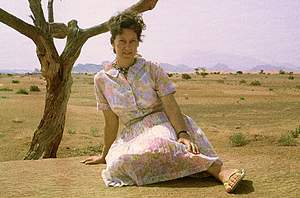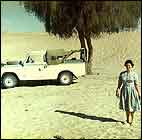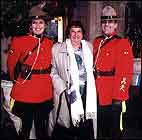Gertrude Dyck, known by many in the UAE as Dr. Latifa, died in Vancouver, Canada, Saturday October 17, 2009. Below are two articles, one announcing her death in The National newspaper of Monday October 19, 2009, the second a profile of Gertrude that appeared in Arabian Woman magazine.
Doctura Latifa, beloved ‘mother’ to thousands
by Tahira Yaqoob

Gertrude Dyck. Courtesy Oasis Hospital
DUBAI // A long-serving nurse who helped launch the UAE’s first hospital, revolutionising health care in the region, has died at the age of 75.
Gertrude Dyck was nicknamed Doctura Latifa, meaning “mercy”, by the thousands of patients who grew attached to her during her 38-year stint at the Oasis Hospital in Al Ain.
She acted as midwife to many of the 90,000 babies born there after it opened in 1960, including members of the Royal Family, and had a long-standing association with Sheikh Zayed, the late founder of the nation, and his relatives.
After her lengthy service, Miss Dyck moved back to her native Canada, where she suffered a fall at her retirement home in British Columbia just over a week ago. She was admitted to hospital but her condition quickly deteriorated and she died from a heart attack at 2.30am on Saturday.
Her death follows the one last year of Marian Kennedy, the doctor who founded the hospital, together with her husband Pat, who died eight years earlier.
Yesterday the hospital to which Miss Dyck devoted half her life led tributes to the devoted nurse.
Brooks Glett, a hospital spokesman, said: “She delivered countless babies for local families. Her nursing skills, her fluency in Arabic and her love for local culture and people earned her their deep trust.
“Many local people to this day proudly claim their children’s mother was Doctura Latifa. In fact, many of those she delivered are the leaders of today’s UAE.”
Miss Dyck was so immersed in Emirati culture and society that she even began teaching colloquial Arabic to new arrivals, he said.
“Her desire was to instil in them the love and compassion she had for local people and she firmly believed this could only happen by understanding their language and culture,” Mr Glett said.
“Like the Kennedys, her life and work at the Oasis Hospital and in the community are a legacy that will always be remembered by those who knew her.”
When Miss Dyck arrived in the Emirates in 1962 as a Christian missionary from Canada, it was only the second time she had ever boarded a plane, let alone lived away from home.
Last year she recalled: “Getting to Abu Dhabi the first time was a real adventure. I had never been anywhere, except once to Chicago.”
Her arduous journey took her to Rome, Beirut, Bahrain and finally Abu Dhabi.
She quickly had to get to grips with learning Arabic and understanding local customs, as few local people then spoke English.
“Looking back, I wonder how I managed it all,” she said in an interview with The National.
“But as Sheikh Mohammed bin Zayed said, as the first of the Royalty to be born at the Oasis, ‘If you had not come, we would not be here.’”
Her memoirs of those crucial years of development were published in a book called The Oasis in 1995. In it she wrote: “Patients began to come from Al Ain and Oman, seemingly from nowhere, to see the doctors and try out their medicine.
Miss Dyck, who never married or had children, returned to Canada on her retirement and, in 2002, was recognised with the Order of Canada and a Queen Elizabeth II Golden Jubilee medal.
tyaqoob@thenational.ae
Gertrude Dyck
If there were such a thing as an honorary UAE national, Gertrude Dyck would certainly qualify. After 40 years in the Emirates, Gertrude shares some of her memories with Rebecca Ponton and talks about recently being awarded Canada's highest civilian honor.
Gertrude Dyck was 28-years old, fresh from the snow-driven prairies of Canada, when she arrived in the Trucial Oman States in 1962 to fulfill what she calls “my lifelong aspirations.” Forty years worth of memories later, “Doctora Latifa,” as she has become known, is still living in the Emirates, among the people she has come to know and love.
Even though it was her first trip out of North America and she left subzero temperatures in Canada, Gertrude says arriving in the desert was not such a shock after living in the wide-open spaces of the Saskatchewan prairies. While it may not have been a shock to her, she and the other Western nurses at the Oasis Hospital in Al Ain were the first white women the Bedouins had ever seen.
“The Bedouins would run their camel sticks down their chests to see if they were really women,” she recalls. “They had never seen women unveiled, uncovered.” While the other women remained in Western attire, Gertrude says, “I came and upset the apple cart,” by adopting her own style of local dress.
“All those bare arms and legs were an embarrassment to the Bedouins - and should have been to us.” Although she never wore the black veil she fashioned after reading Wilfred Thesinger's book Arabian Sands, while still in Canada, she bought long pants to wear under her dresses, and then graduated to long dresses. Even now, Gertrude often prefers colourfully embroidered kandooras to Western clothes.
 While it was easy enough to adopt to the local style of dress, learning the language was another matter. Fluent in English, French, Spanish, and German, Gertrude didn't know a word of Arabic upon her arrival in the Middle East. A local once asked why she was so old and didn't know how to talk!
While it was easy enough to adopt to the local style of dress, learning the language was another matter. Fluent in English, French, Spanish, and German, Gertrude didn't know a word of Arabic upon her arrival in the Middle East. A local once asked why she was so old and didn't know how to talk!
She was sent to Bahrain for six months of language training, and it was shortly after this time that she adopted the name of Latifa. No one could say Gertrude, but when a man in Bahrain called her “Grapefruit,” she knew it was time to come up with a name the local people could pronounce. She has been known as Latifa (which means kindness and mercy) ever since.
Her language studies were cut short when she was called back to Al Ain after only three months due to the shortage of nurses. “I had to sink or swim,” she says. “Nobody knew English in those days so you had to know the language, you had to be able to speak fluently.” Ironically, she learned the language so well that she later went on to teach Arabic to the staff at the Oasis Hospital.
Mother of the rulers
Gertrude had the rare privilege of knowing Sheikh Zayed's mother, Sheikha Salaama bint Butti Al Qubaisi. The last story in her book, The Oasis: Al Ain Memoirs of Doctora Latifa, (Motivate Publishing, 1995) with a forward by HH Sheikh Mohammed bin Zayed Al Nahyan, talks about the special proverbs and Arabic sayings that she learned from Sheikha Salaama, some of which even local women are unaware of today. She tries to carry on the tradition and sometimes when she uses Sheikha Salaama's phrases, her local companions will sit up and take notice, asking, “Where did you learn that?”
Gertrude speaks of Sheikha Salaama, who was fondly known as Umm esh Shyuukh (“mother of the rulers”), with great admiration. “She was definitely a matriarch and brought up her boys well, teaching and instructing them until the day she died. She was indeed a very intelligent and wonderful woman and should be known about in this country.” Gertrude has often thought of doing a study on Sheikha Salaama and writing a book, but now says she thinks it would be best if one of the local girls did it. If so, one would hope they would consult Doctora Latifa for her valuable input.
Sheikh Zayed
Because it was the first hospital in Abu Dhabi, Gertrude and the rest of the staff became accustomed to treating members of the royal family and delivering their babies, just as they did the Bedouins and ordinary citizens. She recalls a time, when there was no doctor present at the hospital, and Sheikh Zayed, needing treatment, asked to have someone make a house call.

Gertrude was sent and she remembers going into the room, where Sheikh Zayed was surrounded by mosquito netting. “Here I am, Sheikh Zayed, how are you? What can I do for you today?” she says in a sing-song voice, still sounding a bit awed at being in his presence.
She has many fond memories of Sheikh Zayed and, while she has the utmost respect for him, she reveals that he can be a practical joker. She recalls the time that she, Dr Marian, and Joyce, the secretary from the hospital, had gone to visit Sheikh Zayed's mother, who was unwell, in her home. They were standing outside in the moonlight saying good-bye and, as they were talking, Sheikh Zayed was playing with his camel stick in the sand.
Suddenly he called out, “Haneesh” meaning “snake!” as he made a wavy line in the sand. “Joyce, the Australian girl with us, screamed and jumped aside and Sheikh Zayed roared with laughter,” Gertrude says. “He always enjoyed a good joke.” To this day, when he sees her, Gertrude says Sheikh Zayed calls out, “Marharba Latifa!”
All my children
While Gertrude feels so privileged to have known members of the royal family that she views it as a “sacred trust,” it is the local people that she has taken to heart. Her book, The Oasis, is dedicated to: “All my children, the children born at Oasis Hospital.” In a sense, they are the children she never had, the husband and family she could only wish to have.
“It's sad because (expatriates) can spend many years here and not know the local people,” Gertrude says. “We had a distinct advantage when we came because foreigners were in the minority,” making it easier to get to know the Emirati people and, of course, her work at the hospital provided daily contact with locals.
Gertrude is so proud of what the people of the Emirates have accomplished since the discovery of oil and with the advent of technology and higher education that you would think they are her children.
“I love to see these young girls who have had the chance to get their doctorate degrees, coming back to the country, teaching in the universities, being entrepreneurs, taking their places in society, and they've got the “schmarts” to do it, and I said that only proves (she raps on the table for emphasis) that those people back (in the old days) were just as intelligent; they just did not have the opportunity!” she exclaims, her eyes gleaming.
Order of Canada
 In a transient society like the Emirates, where expatriates come and go every few years, it's incredible that Gertrude has lived there for 40 years, but she knew when she decided to go that it was a lifelong commitment. The Government of Canada has recently recognised her life of dedication and service to the people of the Emirates. In February, in a ceremony in Canada, Governor General Adrienne Clarkson, representing Queen Elizabeth II as Head of State, presented Gertrude with the Order of Canada, that country's highest civilian honour.
In a transient society like the Emirates, where expatriates come and go every few years, it's incredible that Gertrude has lived there for 40 years, but she knew when she decided to go that it was a lifelong commitment. The Government of Canada has recently recognised her life of dedication and service to the people of the Emirates. In February, in a ceremony in Canada, Governor General Adrienne Clarkson, representing Queen Elizabeth II as Head of State, presented Gertrude with the Order of Canada, that country's highest civilian honour.
“Ms Dyck is an outstanding example of a person raised in a tradition of religious values and caring, who has devoted her entire life to improving the lives of the people,” says Christopher Thomson, Ambassador to the UAE. “There can be few Canadians with such a lifetime of compassion and caring nor a better example of the kind of multicultural understanding that we so earnestly seek to promote in Canada.”
For Gertrude, the trip to Canada was also an opportunity for her to rediscover her Canadian roots and to learn to appreciate her home country all over again, having spent so little time there in the past four decades.
She visited the parliament buildings in Ottawa, and toured Quebec, the oldest city in Canada and the only walled city in the country. She celebrated Canada's gold medal in hockey in the Winter Olympics in the streets of Toronto with her fellow Canadians. She met the UAE Ambassador, Hussan M O. Al Suwaidi, who presented her with a beautifully ornate silver and gold replica of Hili Fort in the city of Al Ain, where Gertrude spent most of her life.
“You spend your whole life and you work hard at what you do and you put your heart and soul into it, and it's so reassuring and comforting that Canada recognised what we did,” Gertrude says, feeling that the award was not only for her work, but for all those involved in establishing the Oasis Hospital so many years ago. “The trip ended up being much more than just receiving an award,” Gertrude adds. “It was the most wonderful, glorious trip of my life.”
A gold mine
It wasn't long, though, before her thoughts turned toward home - her adopted home, that is. Gertrude now lives in Abu Dhabi, but the residents of Al Ain still feel rather proprietary towards her. The mother of Crown Prince Sheikh Kalifa recently asked her, “Oh, Latifa, what are you doing in Abu Dhabi? You're an Al Ain girl.” Gertrude replied, “I'm with Sheikh Kalifa Hospital.”
“Oh, well, that's okay, but you must come to Al Ain for Thursday and Friday.” And she does. She returns for weddings and visits with her cherished friends.
Doctora Latifa retired from active nursing in 1988, but stayed on at Oasis Hospital as part of its cultural orientation team, sharing the wisdom and insight she has gleaned from her years among the Emirati people with the new staff, as well as teaching them Arabic. Although she retired from the hospital in 2000, thinking she might return to Canada, in the end, she couldn't bring herself to do it. Her dilemma was solved when she was invited to work for InterHealth Canada. For the past year and a half, she has enjoyed her role as a Cultural Advisor, helping its employees acclimate to a new culture and customs.
She says she hopes to stay in the Emirates at least another two years until she turns 70, but it's not hard to imagine that, when the time comes, she will find a reason to stay longer. After all, she still has so many goals she would like to accomplish.
“These people have come so far in such a short time,” says Gertrude, who has been a witness to the dramatic changes. “The world doesn't know there is a gold mine [here]. And I want for all the world to know it now.”
She has a dream to put together a book or maybe even create a video, using actual scenes in exactly the same locations from the past and the present, and weaving stories in among the footage. It would, after all, be the story of her life as well.
Courtesy: Arabian Woman
In 2001, Gertrude was named a Member of the Order of Canada, her appointment noted in
the national
Gazette published by the Government of Canada.
Government House
The Order of Canada
"The Governor General, the Right Honourable Adrienne Clarkson, in her capacity as Chancellor and Principal Companion of the Order of Canada, has appointed the following persons, who have been recommended for such appointment by the Advisory Council of the Order of Canada."